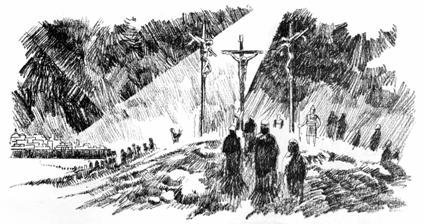 Before Jesus ascended to heaven, He gave this commission to His disciples:
Before Jesus ascended to heaven, He gave this commission to His disciples: Have you heard the Good News??
The Forgiveness of Sin
 Before Jesus ascended to heaven, He gave this commission to His disciples:
Before Jesus ascended to heaven, He gave this commission to His disciples:
"Go into all the world and preach the gospel to the whole creation" (Mark 16:15).
Luke records the same commission in these words:
"Thus it is written, that the Christ should suffer and on the third day rise from the dead, and that repentance and forgiveness of sins should be preached in His name to all nations, beginning from Jerusalem" (Luke 24:47).
From a comparison of these two scriptures it is clear that the central message of the gospel is the forgiveness of sins. This is the message Jesus commanded His church to give. On the day of Pentecost Peter proclaimed,
"Repent, and be baptized every one of you in the name of Jesus Christ for the forgiveness of your sins; and you shall receive the gift of the Holy Spirit" (Acts 2:38).
And again, when the gospel was first given to the Gentiles, Peter referred to the commission of Christ:
"And He commanded us to preach to the people, and to testify that He is the One ordained by God to be Judge of the living and the dead. To Him all the prophets bear witness that every one who believes in Him receives forgiveness of sins through His name" (Acts 10:42, 43).
Paul gave the same message. After showing from Scripture that Jesus is the Christ, the apostle concluded,
"Let it be known to you therefore, brethren, that through this Man forgiveness of sins is proclaimed to you" (Acts 13:38).
Whenever the Lord's Supper is celebrated, the forgiveness of sins is celebrated. Christ took the cup and said,
"Drink of it, all of you; for this is My blood of the covenant, which is poured out for many for the forgiveness of sins" (Matt. 26:27, 28).
The forgiveness of sins is the central teaching of the Gospels. To the man let down through the roof, Christ said,
"My son, your sins are forgiven" (Mark 2:5).
And of Mary, who had crept into the feast at Simon's house and broken a bottle of expensive ointment on His feet, Christ said:
"Her sins, which are many, are forgiven, for she loved much; but he who is forgiven little, loves little." And He said to her, "Your sins are forgiven." Then those who were at table with Him began to say among themselves, "Who is this, who even forgives sins?" And He said to the woman, "Your faith has saved you; go in peace." (Luke 7:47-50).
Here the words saved and forgiven are used synonymously. But not only is salvation linked with forgiveness. In Ephesians Paul equates redemption with forgiveness:
"In Him we have redemption through His blood, the forgiveness of our trespasses, according to the riches of His grace" (Eph. 1:17).
Thus, he who is forgiven is saved and has eternal life. No one can candidly read the words of Jesus or the apostles and deny that this great truth is the central point of all gospel preaching.
The Spirit of the Gospel
Psalm 32 is one of the great psalms quoted by Paul in the book of Romans (Rom. 4:6-8). This psalm beautifully expresses the essence of Christianity.
Blessed is he whose transgression is forgiven,
whose sin is covered.
Blessed is the man to whom the Lord imputes no iniquity,
and in whose spirit there is no deceit.
When I declared not my sin, my body wasted away
through my groaning all day long.
For day and night Thy hand was heavy upon me;
my strength was dried up as by the heat of summer.
I acknowledged my sin to Thee,
and I did not hide my iniquity;
I said, "I will confess my
transgressions to the Lord";
Then Thou didst forgive the guilt of my sin.
Therefore let every one who is godly offer prayer to Thee.
—Psalm 32:1-6.
We can also translate the last sentence, "This is how the godly pray." In other words, this is the spirit of the godly person. The blessed person is the person whose transgression is forgiven and in whose spirit there is no deceit. The King James Version translates "deceit" as "guile." The expression "without guile" is used to describe those who meet Christ at His coming (Rev. 14:5). They are those who live without pretense, without hypocrisy, who frankly acknowledge their need of divine mercy. They live by the forgiveness of sins.
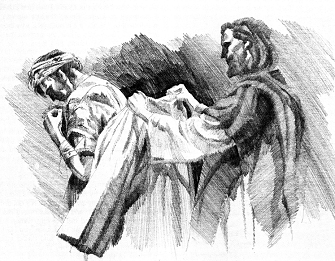 1 John 1:8-9 warns:
1 John 1:8-9 warns:
If we say we have no sin, we deceive ourselves, and the truth is not in us. If we confess our sins, He is faithful and just, and will forgive our sins and cleanse us from all unrighteousness.
The forgiveness of sins is the very essence of the gospel message. The basic characteristic of the Christian community is that they constantly confess their belief in and need of the forgiveness of sins. They have eternal life and are saved.
The justice of God demands perfect righteousness. A perfect God does not lower His standard simply because we are now sinners. God requires of us today just what He required of Adam before the fall—perfect obedience to His holy law. In order to stay out of debt, we would have to meet the demands of that law every moment of our existence. But is there anyone filled with the Holy Spirit who meets that demand in this life? Of course not. James says,
"We all make many mistakes" (James 3:2).
Jesus tells us that when we have done all we should have done, we must still say,
"We are unworthy servants" (Luke 17:10 ).
All Fall Short of the Glory of God
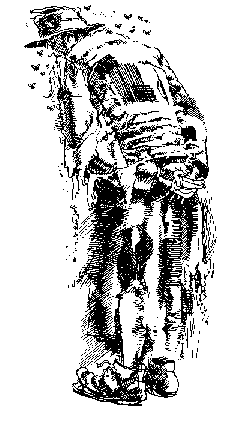 All continue to fall short of the glory of God. If anyone says he meets that demand, if anyone fails to confess he is an unworthy servant, if anyone refuses to say he has sinned in word and thought and deed when judged by the great standard of the law of God, that man is a liar and the truth is not in him. David's prayer includes us all:
All continue to fall short of the glory of God. If anyone says he meets that demand, if anyone fails to confess he is an unworthy servant, if anyone refuses to say he has sinned in word and thought and deed when judged by the great standard of the law of God, that man is a liar and the truth is not in him. David's prayer includes us all:
"Enter not into judgment with Thy servant; for no man living is righteous before Thee" (Ps. 143:2).
Our Lord emphasized the continual need of cleansing and forgiveness (John 13:3-15). Christ teaches us to pray—not just once, not just now and then, but as often as we ask for our daily bread—
"Forgive us our debts as we also have forgiven our debtors" (Matt. 6:12)
Says the Epistle to the Galatians,
"The whole law, is fulfilled in one word, 'You shall love your neighbor as yourself"' (Gal. 5:14).
Christ declared:
"You shall love the Lord your God with all your heart, and with all your soul, and with all your mind. This is the great and first commandment. And a second is like it, You shall love your neighbor as yourself. On these two commandments depend all the law and the prophets." (Matt. 22:37-40).
The law of God demands love—love to God and man. We should make God first and last and best in everything. We should be devoted to Him with all the ardor and fervor of our being. Praise and gratitude should flow to Him continually. And we should be just as concerned for our neighbor's welfare as for our own. We should love him as we love ourselves. Paul says,
"Owe no one anything, except to love one another" (Rom. 13:8).
But when we stand under the scrutiny of God's law, do we really think we have paid our debt? Of course not! We must hide our lack of perfection in Christ.
The Lord Jesus Christ declared that the Holy Spirit convicts us all of sin and guilt:
And when he (the Holy Spirit) comes, he will convince the world of its sin, and of God's righteousness, and of the coming judgment. John 16:8
But the Holy Spirit also comes with an invitation and a call to repentance towards God and faith in the blood of Christ:.
You know that I have not hesitated to preach anything that would be helpful to you but have taught you publicly and from house to house. 21 I have declared to both Jews and Greeks that they must turn to God in repentance and have faith in our Lord Jesus. Acts 20:20-21
While Peter was preaching repentance and the forgiveness of sins to Cornelius,
"the Holy Spirit fell on all who heard the word" (Acts 10:44 ; cf. Acts 2:38).
Where the Holy Spirit is present, the fruits of the Spirit will also be present. The forgiveness of sin and the gift of eternal life are promised to all who personally call upon the name of Jesus Christ in repentance towards God and faith in the blood of Christ shed on Calvary to wash away the guilt and shame of sin.
 The Fruit of the Gospel
The Fruit of the Gospel
We must not, of course, despise good works and obedience to the Law of God, the Ten Commandments. The Scriptures plainly teach that in the final judgment our works will be the evidence of our faith. But sometimes we forget the kind of works the judgment will approve. Works will not be valued merely by their appearance. Many will enter the judgment with apparently wonderful works. But the Lord will say to them,
"I never knew you; depart from Me, you evildoers" (Matt. 7:23 ).
"For what is exalted among men is an abomination in the sight of God" (Luke 16:15 ).
How then does God judge works? What works will He approve in the final judgment?
No deed of God's children—even giving a cup of cold water to a little one in the name of Jesus Christ (Mark 9:4 1) will be forgotten if prompted by gratitude for the forgiveness of sins. What a contrast are such works to those of self-righteous Laodiceans, who do not even feel the need of forgiveness!
Nothing reaches so fully to the deepest motives of conduct as a sense of the pardoning love of Christ. The love motive will never be greater than when we realize the greatness of our pardon. That which produces a genuine victorious life in the sight of God is the embracing of the central point of the gospel message:
"Through this Man forgiveness of sins is proclaimed" (Acts 13:38).
The writer to the Hebrews declares that the conscience must be purified from sinful dead works to serve the living God. It is the blood of Christ, shed for the forgiveness of sins, that alone can purify the conscience (Heb. 9:14 , 22). Only the forgiveness of sins by the blood of Christ will enable us to live before God with a good conscience. We will therefore never be able to truly serve God unless we heartily embrace the forgiveness of sins.
"Sin shall not have dominion over you, since you are not under law but under grace" (Rom. 6:14).
Grace is Simply the Forgiveness of Sins
Since guilt is the primary cause of sin, the only way to break the power of sin is to remove the guilt. Thus, when we clearly understand that Christ's righteousness is freely put to the account of all repentant sinners who call upon the name of Christ, Satan's power over us is broken. Why does the imputed reckoned righteousness of Christ break the devil's power? As Paul would say, it puts God's people "under grace." They are no longer guilty in the sight of God. Christ's obedience stands in place of their disobedience. God looks at them as if they had never sinned. Because they have a clear conscience, they can now serve the living God.
The great truth of the forgiveness of sins restores our relationship to God. It gives us a good conscience toward Him. Those who live by the forgiveness of sins will realize they cannot stand before God a moment without forgiveness.
Forgiveness is not only needed for the occasional slip. Even our best deeds need forgiveness. Our love for God and our neighbors, and even our prayers to God, are imperfect and not what they ought to be. A man who lives by the forgiveness of sins is bowed down by a sense of God's mercy. He lives as a beggar. Moment by moment his only plea before God is, "Lord, be merciful to me a sinner." And if he realizes that he stands before God on this basis, he will live in a new relationship to his fellow men. A forgiven Christian is a forgiving Christian.
The Final Judgment Day
In the judgment God will be more interested in the spirit of a man's heart than in his mere outward performance. Tragically, many "religious" people will lose eternal life and be condemned in the judgment. It is possible to be meticulous in religious duties and yet be intolerant, harsh, unforgiving and unmerciful, and unclean in spirit.
Remembering that God saves us according to His mercy, we put our hands over our mouths. Our relationship to our fellow man is modified and sweetened by the element of divine mercy that pervades the entire life. We begin to act toward others as God has acted toward us.
"We must all appear before the judgment seat of Christ" (1 Cor. 5:10).
We are judgment-bound. But we will need something more with which to face that final judgment than a Pharisaical righteousness.
For. . . "unless your righteousness exceeds that of the scribes and Pharisees, you will never enter the kingdom of heaven" (Matt. 5:20).
We need the practical righteousness of spirit that goes to the very heart and motives. But we cry out, "Lord, what will produce this righteousness?" Only embracing the great gospel message of the forgiveness of sins will produce such a righteousness.
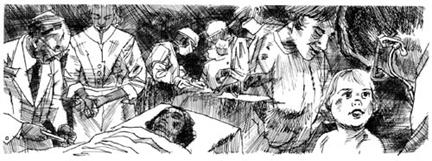
No repentant sinner who leans his soul on the forgiveness of sins will ever be lost. And the man who does this will be doing good works. There will be fruit in his life. His works may seem lowly. No one may notice them. He may not even notice them himself. But God sees them because this man lives by the forgiveness of sins. His works in the judgment are therefore only the evidence of the great Christian faith—"I believe in the forgiveness of sins."
Let "whosoever will" call upon His name in prayer to God and He will not only freely forgive, but He will give the gift of the Holy Spirit to begin to write God's Law upon the heart of the repentant forgiven believer. In the message of the gospel of Christ all are being called to trust in God's unmerited grace by faith in the blood of Jesus Christ to wash away all their sin and guilt. The free gift of forgiveness and eternal life is promised to all sinners who accept the invitation to come to Christ to partake of the cleansing water of life.
Will You Call Upon the Name of Jesus Christ??
Will you cast yourself upon the mercy of God in Christ? Pray this simple prayer to Jesus now and He will not cast you away. Start each and every day with a prayer like this:
Lord Jesus, I know that my life is full of sin and selfishness.
Please forgive me of my sins and treat me as sinless through faith in your sinless life and atoning death on Calvary. Please write your commandments upon my heart and daily teach me to call upon you for your forgiveness and unmerited grace.
Be the Lord and Shepherd of my life and let me learn to love and serve others as you have loved me and forgiven me and given Yourself to die for my sins. Save me now and remember me when you come again at the end of the age to judge the world.
I pray in Jesus' name. Amen.
As you daily call out to Him with this prayer, Christ will begin to write His Law, the Ten Commandments upon your heart and mind—
Hebrews 10:16 This is the covenant that I will make with them after those days, saith the Lord, I will put my laws into their hearts, and in their minds will I write them; 17 And their sins and iniquities will I remember no more.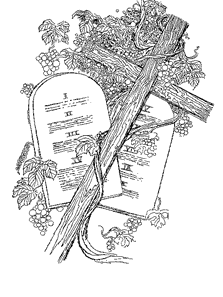
1John 3:3 Everyone who has this hope in him purifies himself, just as he is pure. 4 Everyone who sins breaks the law; in fact, sin is lawlessness. 5 But you know that He appeared so that He might take away our sins. And in Him is no sin. 6 No one who lives in Him keeps on sinning. No one who continues to sin has either seen him or known Him.
The Law of God: The Ten Commandments:
Exodus 20:3 "You shall have no other gods before me.
4 "You shall not make for yourself an idol in the form of anything in heaven above or on the earth beneath or in the waters below.
5 You shall not bow down to them or worship them; for I, the LORD your God, am a jealous God, punishing the children for the sin of the fathers to the third and fourth generation of those who hate me,
6 but showing love to a thousand generations of those who love me and keep my commandments.
7 "You shall not misuse the name of the LORD your God, for the LORD will not hold anyone guiltless who misuses his name.
8 "Remember the Sabbath day by keeping it holy.
9 Six days you shall labour and do all your work,
10 but the seventh day is a Sabbath to the LORD your God. On it you shall not do any work, neither you, nor your son or daughter, nor your manservant or maidservant, nor your animals, nor the alien within your gates.
11 For in six days the LORD made the heavens and the earth, the sea, and all that is in them, but he rested on the seventh day. Therefore the LORD blessed the Sabbath day and made it holy.
12 "Honour your father and your mother, so that you may live long in the land the LORD your God is giving you.
13 "You shall not murder.
14 "You shall not commit adultery.
15 "You shall not steal.
16 "You shall not give false testimony against your neighbour.
17 "You shall not covet your neighbour's house. You shall not covet your neighbour's wife, or his manservant or maidservant, his ox or donkey, or anything that belongs to your neighbour."
This little Christian tract is a gift from your neighbor: